

Françoise Dolto. Un article de Wikipédia, l'encyclopédie libre.
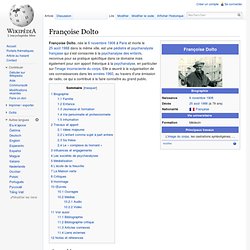
Françoise Dolto Principaux travaux L'image du corps, les castrations symboligènes, ... Françoise Dolto, née le à Paris et morte le dans la même ville, est une pédiatre et psychanalyste française qui s'est consacrée à la psychanalyse des enfants, reconnue pour sa pratique spécifique dans ce domaine mais également pour son apport théorique à la psychanalyse, en particulier sur l'image inconsciente du corps. Elle a œuvré à la vulgarisation de ces connaissances dans les années 1960, au travers d'une émission de radio, ce qui a contribué à la faire connaître au grand public.
Child Psychology and Parenting Blog: Child-Psych.org. Core skills in special educational needs (SEN) and disability - TDA. Misunderstood Minds. Special Education News.
Untitled Page. Le forum des enseignements spécialisés. Overview : Special Education : Programs : Graduate Studies : Simmons College - Boston, Massachusetts. B.O. spécial du 8 mai 1997 : Référentiels de compétences des enseignants spécialisés. B.O.E.N.
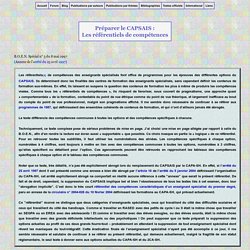
Spécial n° 3 du 8 mai 1997 (Annexe de l’arrêté du 25 avril 1997) Les référentiels(1) de compétences des enseignants spécialisés font office de programmes pour les épreuves des différentes options du CAPSAIS. Ils déterminent donc les finalités des centres de formation des enseignants spécialisés, sans cependant définir les contenus de formation eux-mêmes. En effet, ils laissent en suspens la question des contenus de formation les plus à même de produire les compétences visées.
Comme tous les « référentiels de compétences », ils risquent de favoriser, sous couvert de pragmatisme, une approche quasi « comportementale » de la formation, contestable du point de vue éthique comme du point de vue théorique, et largement inefficace au bout du compte du point de vue professionnel, malgré son pragmatisme affiché. Special Education Teachers. Special Education Teachers Elementary TeachersSpecial Education Teachers English and Communication Arts TeachersHi I am Lisa Lanham and Inclusion Specialist at Hastings Elementary in Duncanville Texas.
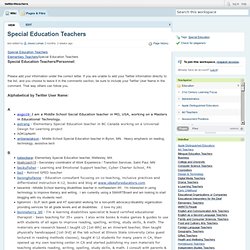
We are a full Inclusion campus and started the process about five years ago. If there is anyone out there looking to make the change write me and we can talk. Knowing we have a "twitter" like forum is exciting and i cant wait to hear from folks. IEP Example. Example: John Doe is a 12 year old boy presently placed in a regular grade 6 classroom with special education support . John Doe is identified as ‘Multiple Exceptionalities’. A Pediatric assessment determined that John meets criteria for Autistic Spectrum Disorder. John's anti-social, aggressive behavior, prevent him from achieving academic success. IEP Samples - French. Special Education. I created this game in my classroom the year that I had several students with emotional disabilities that had a lot of behavior issues.
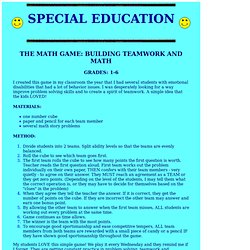
I was desperately looking for a way improve problem solving skills and to create a spirit of teamwork. A simple idea that the kids LOVED! One number cube paper and pencil for each team member several math story problems Divide students into 2 teams. Split ability levels so that the teams are evenly balanced. My students LOVE this simple game! Submitted by JOANNIE HOLLIS-SMITH LODGE ELEMENTARY SCHOOL EVANSVILLE, IN jhollissmith@yahoo.com This is not an original idea, but it's well worth repeating for those of you who may not have come across it. E-READY Special Education Site. Deafness & Hearing Impairment - Special Topics The ERIC digests contain a very complete set of explanations of several different communication strategies for students who are deaf or hearing impaired. While most of these are written for a professional audience, parents may also find many of these documents useful. The references at the end of each digest provide valuable starting points for additional reading or research.
Room Arrangement: Classroom Management & Organization Tips for Teachers. Increasing Attention. Teaching Special Kids: Online Resources, Special Education Curriculum. Class Rules and Expectations SY 2008-2009. Teaching Tactics that Encourage Active Learning. Use the following tactics during class to ensure that students are actively engaged in thinking about the content.
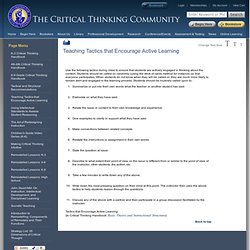
Students should be called on randomly (using the deck of cards method for instance) so that everyone participates. When students do not know when they will be called on they are much more likely to remain alert and engaged in the learning process. Students should be routinely called upon to: Summarize or put into their own words what the teacher or another student has said. Elaborate on what they have said. TeachersFirst Exclusives. Maternal Instincts. Fighting Monsters with Rubber Swords. Before You Pick a Pediatrician - Five Things to Consider When Choosing Your Child's Doctor. You know what you want for your child -- the best doctor possible, right?
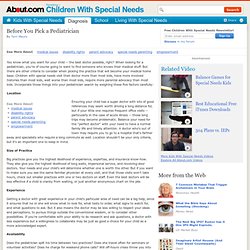
When looking for a pediatrician, you're of course going to want to find someone who knows their medical stuff. But there are other criteria to consider when picking the practice that will become your medical home base. Children with special needs visit their doctor more than most kids, have more involved histories than most kids, wait worse than most kids, require more parental advocacy than most kids.
Association de Parents d'Enfants Inadaptés de l'Ile Maurice - Documentation. Special needs education within the education system - Finland — European Agency for Development in Special Needs Education. Pre-School Education Pre-school education builds on the basic values of society. These have been stipulated in national legislation and international declarations, recommendations and/or conventions. The role of pre-school education is to promote children’s growth into individual human beings and ethically responsible members of society by guiding them towards responsible action and compliance with generally accepted rules and towards appreciation of other people.
The core role of pre-school education is to promote children’s growth, development and learning opportunities and support and monitor physical, psychological, social, cognitive and emotional development and prevent any difficulties that may arise. My Take on Learning in the 21st Century. In my previous piece, “What is 21st Century Learning?”
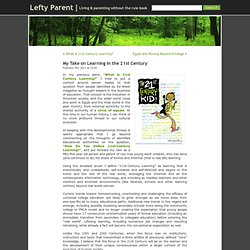
I tried to put a context around eleven replies to that question from people identified by Ed Week magazine as thought-leaders in the business of education. That context is the transition in American society, and the wider world (case and point is Egypt and the Arab world in the past month), from external authority to the shared authority of a circle of equals. At this time in our human history, I can think of no more profound thread in our cultural evolution. In keeping with this developmental thread, it seems appropriate that I go beyond commenting on the thoughts of identified educational authorities on the question, “How Do You Define 21st-Century Learning?” , and put forward my own as a fifty-five year old person and parent of two now young adult children, who has done (and continues to do) his share of formal and informal (that is real life) learning. Call me crazy, naïve or both, but that is how I answer Ed Week‘s question. Disabled Children's Unit.
Over the last year we have been fundraising to make a Disabled Children's School in Kerobokan, Bali. This unit will specialise in physically disabled children from birth through to 16 years old. We will use conductive education as our main therapy but this will be enhanced with other well respected therapies and education techniques. What is our aim? To provide a safe, happy, supportive, natural, classroom environment, free of charge, for children with physical disabilities living within the community. What are the aims of the unit? We will cater to all aspects of the child’s well being, incorporating a holistic approach, which encompasses therapy, education, pastoral care, medical support and independence training.